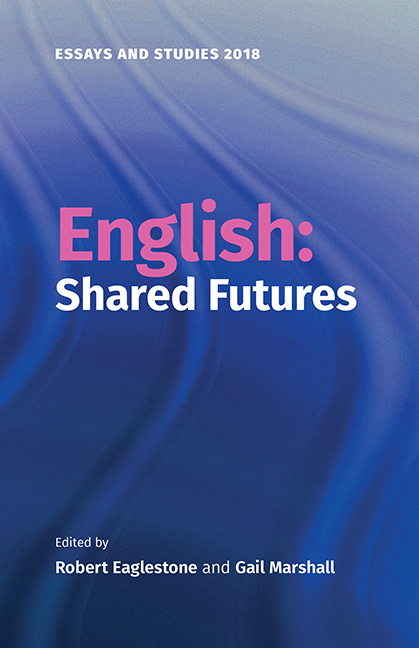Book contents
- Frontmatter
- Contents
- Notes on Contributors
- Acknowledgements
- Abbreviations
- Introduction
- The Changing Picture of School English
- From A-Level to HE: Working Towards a Shared Future?
- English Outreach: Academics in the Classroom
- From Provider to Stager: The Future of Teaching English in HE
- Pedagogic Criticism: An Introduction
- Exquisite Tensions – Narrating the BAME ECA Experience
- Postgraduate Futures: Voices and Views
- Shared Futures: Early Career Academics in English Studies
- Some Reflections on the Funding of English Departments
- English: The Future of Publishing
- Digital Futures
- A View from the United States: The Crisis in the Humanities; the Liberal Arts; and English in the Military Academy
- The Future of Borders
- ‘Between and Across Languages’: Writing in Scotland and Wales
- Exploring Intersections between Creative and Critical Writing: An Interview with Elleke Boehmer
- Integrating English
- Employability in English Studies
- Creative Living: How Creative Writing Courses Help to Prepare for Life-long Careers
- Practice at Large: How Creative Writing can Enhance University Research Environments
- ‘And who can turn away?’ Witnessing a Shared Dystopia
- English and the Public Good
- ‘Can Wisdom be put in a silver rod? / Or Love in a golden bowl?’ On Not Defending the Humanities
- ‘Something Real to Carry Home When Day Is Done’: The Reader in Future
- Afterword
- Index
Shared Futures: Early Career Academics in English Studies
Published online by Cambridge University Press: 15 October 2019
- Frontmatter
- Contents
- Notes on Contributors
- Acknowledgements
- Abbreviations
- Introduction
- The Changing Picture of School English
- From A-Level to HE: Working Towards a Shared Future?
- English Outreach: Academics in the Classroom
- From Provider to Stager: The Future of Teaching English in HE
- Pedagogic Criticism: An Introduction
- Exquisite Tensions – Narrating the BAME ECA Experience
- Postgraduate Futures: Voices and Views
- Shared Futures: Early Career Academics in English Studies
- Some Reflections on the Funding of English Departments
- English: The Future of Publishing
- Digital Futures
- A View from the United States: The Crisis in the Humanities; the Liberal Arts; and English in the Military Academy
- The Future of Borders
- ‘Between and Across Languages’: Writing in Scotland and Wales
- Exploring Intersections between Creative and Critical Writing: An Interview with Elleke Boehmer
- Integrating English
- Employability in English Studies
- Creative Living: How Creative Writing Courses Help to Prepare for Life-long Careers
- Practice at Large: How Creative Writing can Enhance University Research Environments
- ‘And who can turn away?’ Witnessing a Shared Dystopia
- English and the Public Good
- ‘Can Wisdom be put in a silver rod? / Or Love in a golden bowl?’ On Not Defending the Humanities
- ‘Something Real to Carry Home When Day Is Done’: The Reader in Future
- Afterword
- Index
Summary
Clara Jones, Introducing the Early Career Strand at English: Shared Futures, 2017
In the early stages of the planning for English: Shared Futures my coorganisers and I decided to use the term Early Career Academic (ECA), rather than Early Career Researcher (ECR), to describe the colleagues our strand of sessions was designed for. It is easy to be cynical about the proliferation and high turnover of acronyms in Higher Education today. In our case, the shift in terminology, although slight, was a considered gesture. Funding bodies and universities have tended to define ECRs in terms of the length of time since the completion of a PhD – for the AHRC an ECR is an ‘individual who is within eight years of the award of their PhD or equivalent professional training’, or an ‘individual who is within six years of their first academic appointment’. Much of the diversity of early-career experiences gets lost in these definitions. One of the aims of the Shared Futures strand was to work with an expanded understanding of what it means to be an ECA in today's academy, including late-stage PhD students increasingly expected to face challenges formerly reserved for those in post, such as publication; precariously employed scholars in fractional or fixed-term work; or colleagues working as teaching fellows with no research duties in their contracts.
We were also keen for the strand to offer ECAs what they felt they needed, especially in terms of training. This included professionalisation staples, such Q&As with publishers and journal editors, a roundtable on demystifying the REF and ‘Starting to Teach’ workshops. The strand also sought to address barriers that prevent access to university English and think about how class, gender and race might define ECA experiences. A panel bringing together black and minority ethnic colleagues made an important and necessary intervention on the subject of BAME representation in English Departments. The ‘Open Voices’ session gave ECAs the chance to discuss the challenges I have already outlined. Four speakers from HE institutions across the country presented position papers on ‘Publications’, ‘Precarious Contracts’, ‘Interdisciplinarity’ and ‘Class’, speaking to their personal experiences of these issues and suggesting ways the academy as a whole and individual departments might work to improve the lot of ECAs.
- Type
- Chapter
- Information
- English: Shared Futures , pp. 64 - 72Publisher: Boydell & BrewerPrint publication year: 2018

